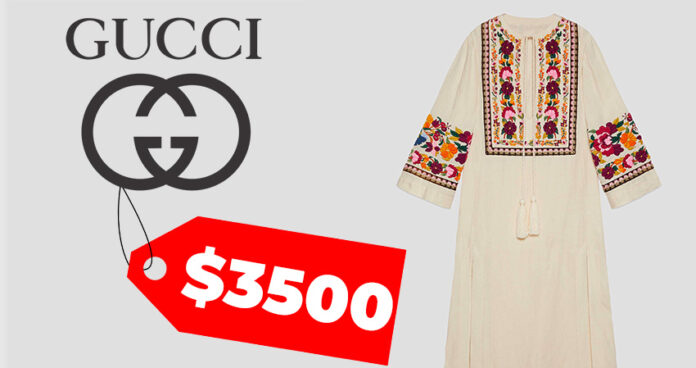The latest collection of Gucci shirts for women has an overly priced piece of cloth with a price tag of $3,500. The expensive Kaftan shirt is shocking Pakistani people bigtime. Folks who saw this fashion item are of the opinion that they can get a similar shirt in Pakistan at a very low price since the shirt under-discussion has an embroidered pattern similar to one found on cultural Pakistani dresses. Besides, the real question here is, why the international brands steal the designs made by Eastern craftsmen and sell them at an unexpected price that only the elite can afford. A locally popular embroidery pattern with cultural aspirations being sold by an international brand also makes people think for those who are barely making any money by selling such clothes in the market whereas the giants make millions by charging exorbitant prices.
Are Eastern Gucci Shirts for Women Becoming A Thing In West?
The latest addition in Gucci shirts for women, the so-called Kaftan is a simple Kameez that local Pakistani vendors sell in the streets of the country. The shirt is embellished with thread work; The kind of thread work or embroidery is commonly done by women from the rural areas. People on Twitter expressed how shocked they were to witness a mannequin representing Gucci on its e-commerce store with a price tag screaming ‘Capitalism’ all over the internet. They noticed a digit so big with a dollar sign and made fun of how they could easily get a full dress for RS 2000-2500 in different cities of Pakistan. Seemingly, brands are what people are more attracted to instead of product or the maker. Those who are attracted to the illusion of capitalism while overlooking handmade products made by women in the remote and rural eastern areas can simply pay Rs 540,977 for a copied design.
Surprisingly, the renowned brand has no boundaries whatsoever. The company made it convenient for the buyers in their own twisted way. It offered a monthly installment plan for those who might be willing to buy the Kurta through the online shop.
Compromised Remote Craftsmen
Many artisans from the remote areas of less developed countries work hard in order to create beautiful designs inspired from culture. Despite facing so many hardships and lack of resources they don’t get recognition for their art and craft in the form of monetary benefit. Where these workers keep busting their heads while offering sophisticated wearables without being well-paid, the market giants sell the copied versions of their creations at very high prices in different parts of the world.
The brands must stop taking credit for what they have not done. In simple words, the idea of selling a cultural expression as someone’s own fashion design seems ridiculous. In past, many designers have been pointed out for doing this. Gucci shirt for women are not the only example of how elite brands steal from cultural expressions. Few years back, Paul Smith made the Peshawari Chappal and they bought it for $595. Making a fashion statement with cultural attire is fine but selling and branding someone else’s cultural craft as a new idea without acknowledging them is inappropriate or condemnable.
Major Hurdles In the Craftsmen’s Way Of Success
In Pakistan, the cultural clothes and even artifacts come from the efforts of the workers. They live in remote areas where they have less or no access to technology and infrastructural marvels. This means that these artisans are unlucky in terms of utilizing the best means of enhancing their businesses in the vast and open to world markets. They can’t market their products and directly profit from them.
Workers who are usually women can’t market their product in a better way due to a lack of resources and education. Even Amazon which is already famous in the world has just added Pakistan to the approved sellers list a few days back, opening opportunities for at least urban sellers in the country. However, the rural workers who design apparel with traditional and cultural patterns of embroidery still need more awareness and resources to tell the world that this specific product belongs to their heritage and skill and not from some brand.


